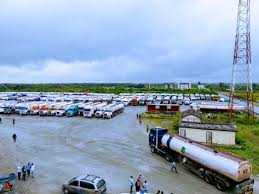
Inflation Jerks Up Household Kerosene Price To N1,340 Per Litre In February
It is authoritatively reported by Channels Television that the price of Household Kerosene (HHK) has increased to N1,340 per litre due to the rise in inflation to 31.70 per cent in February, which will make cooking meals more expensive for impoverished Nigerians.
An increase of 0.86 percent was observed in the price of household paraffin from N1,329.53 in January to N1,340.94 in February 2024, according to data from a recently released report by the National Bureau of Statistics (NBS), which was obtained on Thursday.
The inflation rate increased from 29.90% in January to 31.70% in February at the same time as this.
In February 2024, consumers paid an average retail price of N1,340.94 per litre of HHK, which was 0.86% more than the N1,329.53 recorded in January 2024, according to the Bureau.
From N1,173.89 in February 2023 to N1,23.3% in February 2023, the average retail price per litre of the product increased annually.
A state profile analysis revealed that Kaduna had the highest average price per litre in February 2024, at N1,866.67. Benue, with N1,769.67, and Niger, with N1,710.89, followed.
Nevertheless, Bayelsa had the lowest price, N971.00, followed by Rivers with N1,065.67 and Kwara with N1,070.44.
Further analysis by zone revealed that the South-South recorded the lowest average retail price per litre of household paraffin, at N1,231.24, while the North Central recorded the highest, at N1,486.50, followed by the North-East at N1,387.58.
In February 2024, the average retail price per gallon that customers paid for the product was N4,880.02, which represents a 0.19 percent increase from N4,870.83 in January 2024.
This grew by 24.29 percent from N3,926.23 in February 2023 on an annual basis.
Following Bauchi at N5,910.00 and Kano at N5,779.50, Adamawa had the highest average retail price per gallon of HHK according to state profile analysis.
However, Delta had the lowest price, recording N4,025.00, followed by N4,250.00 in Ondo and Abuja.
According to zone-by-zone analysis, the North-East had the highest average retail price per gallon of the product at N5,553.05, followed by the North West at N5,072.23. The South-East had the lowest average retail price, at N4,518.91.
Over the past few years, food prices have risen throughout Nigeria, made worse by the effects of government policies like the elimination of petrol subsidies, among other things.
The rising cost of these necessities and other goods has reduced many citizens' purchasing power, making it harder for many households in the nation to pay for daily meals.
The official and unofficial markets have both been impacted by the removal of subsidies and the nation's rising inflation rate, among other factors, which has caused prices for goods and services to soar nationwide.
Food and non-alcoholic beverages (16.42%), housing, water, electricity, gas, and other fuel (5.30%), clothing and footwear (2.24%), and transportation (2.06%) are the divisional year-over-year items that contributed to the increase in the headline index, according to the NBS's inflation report.
Additional categories include furnishings, home appliances, and maintenance (1.59 percent), education (1.25 percent), health (0.95 percent), other goods and services (0.53 percent), dining establishments and lodging (0.38 percent), tobacco, alcohol, and cola (0.34 percent), leisure and culture (0.22 percent), and communication (0.22 percent).
The average CPI's percentage change from the previous year's average to the twelve months ending in February 2024 was 26.18 percent, indicating a 6.31 percent increase from the 19.87 percent recorded in February 2023.
Food price inflation
In February 2024, the annual percentage rate of food inflation was 37.92 percent, representing a 13.57 percent point increase over the rate recorded in February 2023 (24.35 percent).
Food inflation, according to the bureau, is a result of rising costs for bread and cereals, potatoes, yam and other tubers, fish, meat, fruit, coffee, tea, and cocoa, as well as for oil and fat.
"Food inflation was 3.79 percent on a month-over-month basis in February 2024, which was 0.58 percent higher than the rate (3.21 percent) recorded in January 2024."
According to the explanation, the increase in the average price of bread and cereals, potatoes, yams and other tubers, fish, coffee, tea, and cocoa was the reason behind the monthly rise in food inflation.





